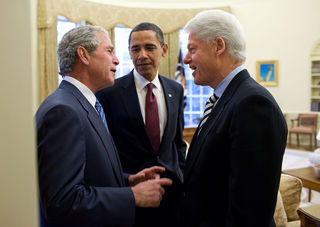Happiness
Presidents and the Pursuit of Happiness
New research demonstrates that the presidency is inimical to happiness.
Posted April 3, 2017
This entry is co-written with my colleague Professor Michael Krassa at the University of Illinois-Urbana.
In the current issue of the much respected (and peer reviewed) academic journal Political Studies, Professors Altman, Flavin, and Radcliff demonstrate empirically what many theorists of democracy have long argued: that the presidential (versus parliamentary) system is not well suited to producing a happy citizenry. Using pooled time series data (from the World Values Surveys) on the universe of industrial democracies beginning in the 1980s, they consider the relationship between “Democratic Institutions and Subjective Well-Being.” Their conclusions are simple and easy to understand: people are happier in parliamentary rather than presidential systems, controlling for other factors.
While the empirical analysis is novel—using real world data from the new “happiness economics” paradigm to show that life satisfaction is adversely affected by the presidential system—the underlying arguments from the political science literature have a long history. They seem especially relevant—and especially troubling—in the context of the highly divisive Trump presidency.
In a famous essay 1990 essay in The Journal of Democracy, Professor Juan Linz summarized the “Perils of Presidentialism” Simplifying somewhat for the sake of brevity, he argued that presidential democracies are highly problematic because they do a poor job of translating public wishes into outcomes, because they promote a “winner take all” mentality such that the president represents (at best) only his or her coalition while pretending to represent the nation, and because they are prone to producing catastrophic disasters leading to the collapse of democracy itself. He noted that among all countries with a strong presidential system, only the United States had (to that date) escaped at least a temporary collapse of the rule of law. In his view, Presidential systems fail because a president is dependent upon neither a broad mass of citizens nor upon legislative co-partisans, and is thus constrained by neither.
Simply put, presidents face few constraints on their powers, compared to Prime Ministers. The latter is head of government only in the sense that he or she enjoys the confidence of the cabinet and the underlying legislative coalition that maintains them in power. The PM thus serves at the pleasure of parliament—such that violating the law or the constitution, engaging in corruption or nepotism, deceiving the public, or just sheer incompetence can cost a PM their job in a single afternoon. Presidents, by contrast, answer to no one, serve a fixed and fairly long term, and can only be removed from office through formal impeachment—an incredibly difficult and time consuming process that has never once been successfully pursued in the entire history of the United States. The presidency is thus frequently characterized by scholars as being nearly an “Imperial” rather than a democratic office—and even an unpopular or politically weak Emperor is still an Emperor.
This theme was also stressed by the 20th centuries most important democratic theorist, the late Robert Dahl, who persuasively argued in his classic Preface to Democratic Theory (1956), that the nominal separation of powers is unlikely to provide the kind of “checks and balances” our high school civics courses assured us was the “genius of American politics.” The judiciary and the legislature can attempt to put breaks on presidential power, but with the strong executive branch associated with the presidential system, executives will usually prevail by the very nature of executive power itself. Roman Emperors, indeed, faced a nominal separation of powers, but they seldom yielded to either to the Senate or to Tribunes of the People (who in theory existed to defend rights and liberties).
Consider Trump’s much discussed defeat over repealing Obamacare. It is certainly true that the legislation failed, but that hardly means the president cannot—as Trump transparently signaled was indeed his intention—use his power to administer the law in such way that will over time eviscerate it. The Department of Health and Human Services—whose head is appointed by and answers to the president—has enormous influence over the details of how Obamacare is managed and implemented. Trump can readily instruct HHS use its power to precipitate the “death spiral” that Republicans like to pretend the Affordable Care Act is already in (e.g. by refusing to enforce the individual mandate to buy insurance and by actively frustrating and purposely disrupting the insurance exchanges).
Worse still, presidents—and Trump most of all—are inclined to view (or to actively attempt to maintain the fiction) that their electoral victory was the mandate from the public as a whole. Conceiving of themselves as advocates of the ordinary person fighting the entrenched centers of power of the underlying regime (“Washington,” the bureaucracy, the “deep state”), they may be inclined—as Trump undoubtedly is—to view opposition or disagreement as unpatriotic, un-American, and even criminal. When their electoral victory is as thin as Trump’s—who did not win a majority of the popular vote, and whose win is tainted not only by the very real possibility that the outcome was aided by Russian interference in the election but also (as the FBI has publicly said it is actively investigating) because he or members of his team were complicit in that meddling—such tendencies can only be exacerbated.
Yet another problem with presidential systems is the effect of the system on voters, such that both those who support and those who oppose the president may find themselves angered or disillusioned. Opponents may encounter the factors noted above—the enormous powers of the president, and in particular both the propensity of the office to take active measures against dissent, such that they may suffer alarm and fear, which may cause them to redouble their efforts to resist the president’s agenda, which not only leads to unhappiness but further stokes partisan divisions, which creates more unhappiness still. Supporters, conversely, may ironically become cynical when they realize that the president, who they implicitly believed could instantly deliver on his or her unrealistic campaign promises, is not, after all, the de facto dictator of policy he pretended to be while a candidate. However powerful, presidents—even Imperial Presidents—cannot instantly change the world.
As events have demonstrated, the constituency for the abolition of the implicit recognition of a right to healthcare that Obamacare embodied was never remotely as large as Republicans convinced themselves it was. Nonetheless, those who expected to see it repealed “on day one” are unlikely to take solace in the fact that the president may need years to slowly demolish it through administrative neglect. In sum, then, the presidential system encourages disapproval of the office—and the political system more generally—from both the president’s supporters and opponents. The result is, of course, less happiness for everyone.
We close with a final point stressed by Professor Juan Linz: presidential systems are in general deleterious to well-being because they are far more prone than parliamentary systems to having politically inexperienced, incompetent, personally corrupt, and authoritarian figures assuming the role of chief executive. Paradigmatic examples would include Peron in Argentina, Fujimori in Peru, Chavez in Venezuela—and, lest we forget, Vladimir Putin. Parliamentary systems provide a natural check against such outcomes, in that again one becomes (and remains) Prime Minister only through the consent of the established parties. A reality TV show star (or, say, a professional wrestler) with no prior political experience might readily become a country’s president (or a state’s governor), but not a Prime Minister.
In this regard France provides an instructive example, having as it does both a (constitutionally weak) president and a (strong) PM. In its upcoming election, one can just imagine the Marine Le Pen, the head of the far-right French National Front, managing to win the Presidency, but at the same time feel absolutely certain she could never hope to become PM, given that the established parties of Left and Right would never (to their credit) join in a coalition with her party. In the last US election, a Le Pen-style outsider was able to capture the executive power of our country precisely because our democracy suffers from the weakness of being presidential.
You can find the full-text of a number of peer reviewed articles on politics and happiness and read a chapter from Radcliff's book The Political Economy of Human Happiness here.

Professor Michael Krassa: @ProfKrassa
Professor Benajmin Radcliff: @Radcliff_Ben




